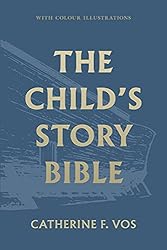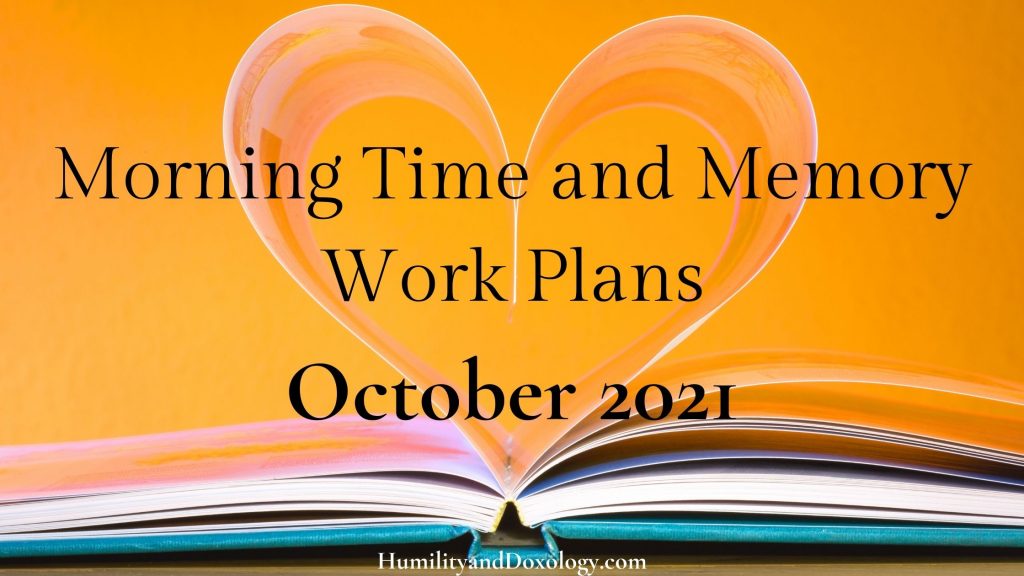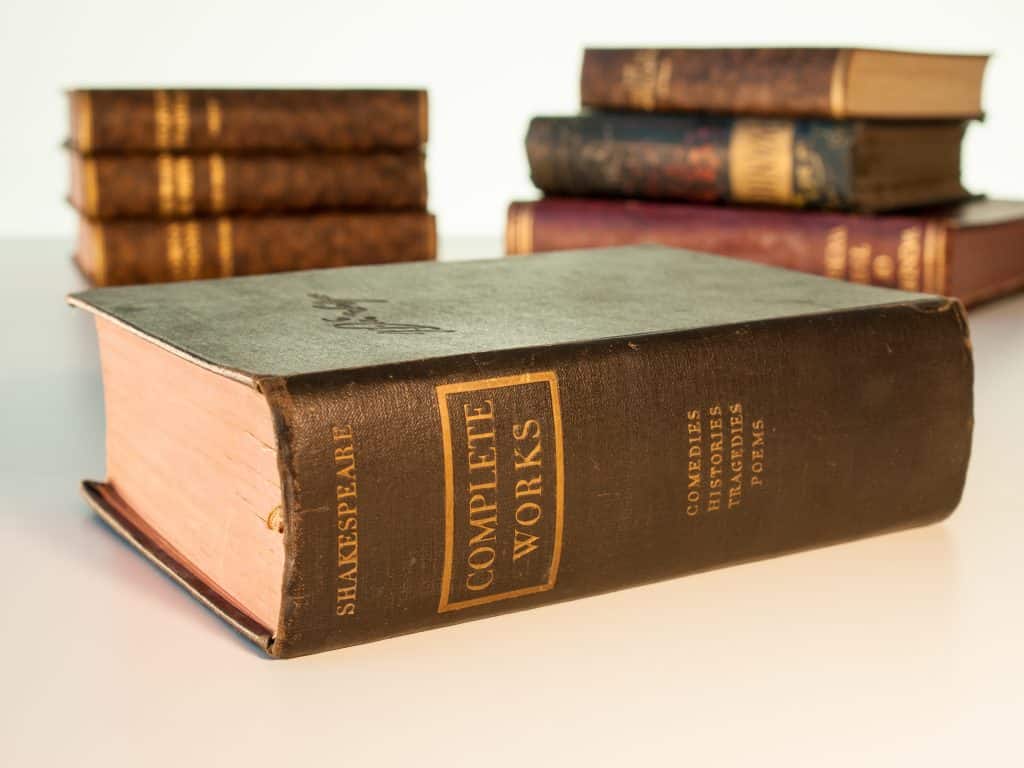Hi friends! It’s time for my monthly(ish) personal blog post, a behind-the-scenes sneak peek into the Sloan family Morning Time plans for October 2021. See below for our memory work for the month, including some Shakespeare recitations from Merchant of Venice! (I’ve added the simple printable we’re using in our own homeschool to the subscriber freebie page, so make sure you’re on my email list for access.)
While the basic flow of Morning Time stays the same each month, we like to change our memory work on a regular basis. (You can see what we did last month here.)
Not included on the list is our daily viewing of WORLD Watch News. We’re still watching this daily, but the timing of it varies depending on my teen son’s work schedule.
You’ll notice that I’ve typed up the Bible memory verses in our preferred responsive reading format. We’ll take turns being the one to read the light print, and everyone else will reply with the dark print. We’ve found this hugely helpful in keeping us focused during our Scripture memory work time!
This month I’m also going to be including the key passages from the Old Testament and New Testament in our Bible memory review time.
On our Shakespeare months, we love to watch clips from Shakespearean productions. Here is the curated playlist I’ve created for Shylock from the Merchant of Venice:
You can read more here about how to choose the best memory work in your own homeschool, or head to the Year of Memory Work for a year’s worth of free printable poems, speeches, and other beautiful pieces for recitation!
More Free Morning Time and Memory Work Plans
- January 2021
- February 2021
- March 2021
- April 2021
- Macbeth printables from August are available exclusively to email subscribers on the subscriber freebie page
- September 2021

{This post contains paid links. Please see disclaimer.}
Morning Time and Memory Work Plans October 2021
- Prayer
- Vos
- Bible memory
- Read Aloud
- Shakespeare
- A Mighty Fortress
- Prayer


Minimum Viable Morning Time (h/t Pam Barnhill):
- Prayer
- Bible memory
- Poem
- A Mighty Fortress
A Mighty Fortress
1 A mighty fortress is our God,
a bulwark never failing;
our helper he, amid the flood
of mortal ills prevailing.
For still our ancient foe
does seek to work us woe;
his craft and power are great,
and armed with cruel hate,
on earth is not his equal.
2 Did we in our own strength confide,
our striving would be losing,
were not the right Man on our side,
the Man of God’s own choosing.
You ask who that may be?
Christ Jesus, it is he;
Lord Sabaoth his name,
from age to age the same;
and he must win the battle.
3 And though this world, with devils filled,
should threaten to undo us,
we will not fear, for God has willed
his truth to triumph through us.
The prince of darkness grim,
we tremble not for him;
his rage we can endure,
for lo! his doom is sure;
one little word shall fell him.
4 That Word above all earthly powers
no thanks to them abideth;
the Spirit and the gifts are ours
through him who with us sideth.
Let goods and kindred go,
this mortal life also;
the body they may kill:
God’s truth abideth still;
his kingdom is forever!
Old Testament and New Testament Key Passages: see Teaching Your Child the Bible In Your Homeschool
Ephesians 2
As for you, you were dead in your transgressions and sins, in which you used to live when you followed the ways of this world and of the ruler of the kingdom of the air, the spirit who is now at work in those who are disobedient.
All of us also lived among them at one time, gratifying the cravings of our flesh and following its desires and thoughts. Like the rest, we were by nature deserving of wrath.
But because of his great love for us, God, who is rich in mercy, made us alive with Christ even when we were dead in transgressions—it is by grace you have been saved.
And God raised us up with Christ and seated us with him in the heavenly realms in Christ Jesus, in order that in the coming ages he might show the incomparable riches of his grace, expressed in his kindness to us in Christ Jesus.
For it is by grace you have been saved, through faith—and this is not from yourselves, it is the gift of God— not by works, so that no one can boast.
For we are God’s handiwork, created in Christ Jesus to do good works, which God prepared in advance for us to do.
Therefore, remember that formerly you who are Gentiles by birth and called “uncircumcised” by those who call themselves “the circumcision” (which is done in the body by human hands)—
remember that at that time you were separate from Christ, excluded from citizenship in Israel and foreigners to the covenants of the promise, without hope and without God in the world.
But now in Christ Jesus you who once were far away have been brought near by the blood of Christ.
For he himself is our peace, who has made the two groups one and has destroyed the barrier, the dividing wall of hostility, by setting aside in his flesh the law with its commands and regulations.
His purpose was to create in himself one new humanity out of the two, thus making peace, and in one body to reconcile both of them to God through the cross, by which he put to death their hostility.
He came and preached peace to you who were far away and peace to those who were near. For through him we both have access to the Father by one Spirit.
Consequently, you are no longer foreigners and strangers, but fellow citizens with God’s people and also members of his household, built on the foundation of the apostles and prophets, with Christ Jesus himself as the chief cornerstone.
In him the whole building is joined together and rises to become a holy temple in the Lord. And in him you too are being built together to become a dwelling in which God lives by his Spirit.
Merchant of Venice Key Passages
In sooth, I know not why I am so sad.
Antonio (Act 1, Scene 1)
I hold the world but as the world, Gratiano,
A stage where every man must play a part,
And mine a sad one.
Antonio (Act 1, Scene 1)
You speak an infinite deal of nothing.
Bassanio (Act 1, Scene 1)
With mirth and laughter let old wrinkles come.
Gratiano (Act 1, Scene 1)
If to do were as easy as to know what were good to do, chapels had been churches, and poor men’s cottages princes’ palaces.
Portia (Act 1, Scene 2)
God made him, and therefore let him pass for a man.
Portia (Act 1, Scene 2)
How like a fawning publican he looks!
I hate him for he is a Christian,
But more, for that in low simplicity
He lends out money gratis and brings down
The rate of usance here with us in Venice.
Shylock (Act 1, Scene 3)
I will buy with you, sell with you, talk with you,
walk with you, and so following, but I will not eat
with you, drink with you, nor pray with you. What
news on the Rialto? Who is he comes here?
Shylock (Act 1, Scene 3)
If I can get him once upon the hip,
I will feed fat the ancient grudge I bear him.
Shylock (Act 1, Scene 2)
The devil can cite Scripture for his purpose.
Antonio (Act 1, Scene 3)
I like not fair terms and a villain’s mind.
Bassanio (Act 1, Scene 3)
Mislike me not for my complexion,
The shadowed livery of the burnished sun.
Morocco (Act 2, Scene 1)
It is a wise father who knows his own child.
Lancelot (Act 2, Scene 1)
But love is blind, and lovers cannot see
The pretty follies that themselves commit.
Jessica (Act 2, Scene 6)
All that glisters is not gold;
Often have you heard that told:
Many a man his life hath sold
But my outside to behold:
Gilded tombs do worms enfold.
Morocco (Act 2, Scene 7)
Young in limbs, in judgement old.
Morocco (Act 2, Scene 7)
The portrait of a blinking idiot
Aragon (Act 2, Scene 9)
Let him look to his bond.
Shylock (Act 3, Scene 1)
Tell me where is fancy bred,
Or in the heart or in the head?
Singer (Act 3, Scene 2)
How far that little candle throws his beams!
So shines a good deed in a naughty world.
Portia (Act 5, Scene 1)
I am never merry when I hear sweet music.
Jessica (Act 5, Scene 1)
The man that hath no music in himself,
Nor is not moved with concord of sweet sounds,
Is fit for treasons, stratagems, and spoils;
The motions of his spirit are dull as night,
And his affections dark as Erebus.
Let no such man be trusted. Mark the music.
Lorenzo (Act 5, Scene 1)
Signior Antonio, many a time and oft
In the Rialto you have rated me
About my moneys and my usances:
Still have I borne it with a patient shrug,
For sufferance is the badge of all our tribe.
You call me misbeliever, cut-throat dog,
And spit upon my Jewish gaberdine,
And all for use of that which is mine own.
Well then, it now appears you need my help:
Go to, then; you come to me, and you say
‘Shylock, we would have moneys:’ you say so;
You, that did void your rheum upon my beard
And foot me as you spurn a stranger cur
Over your threshold: moneys is your suit
What should I say to you? Should I not say
‘Hath a dog money? is it possible
A cur can lend three thousand ducats?’ Or
Shall I bend low and in a bondman’s key,
With bated breath and whispering humbleness, Say this;
‘Fair sir, you spit on me on Wednesday last;
You spurn’d me such a day; another time
You call’d me dog; and for these courtesies
I’ll lend you thus much moneys’?
Shylock (Act 1, Scene 1)
Salarino: Why, I am sure, if he forfeit, thou wilt not take
his flesh: what’s that good for?
Shylock: To bait fish withal: if it will feed nothing else,
it will feed my revenge. He hath disgraced me, and
hindered me half a million; laughed at my losses,
mocked at my gains, scorned my nation, thwarted my
bargains, cooled my friends, heated mine
enemies; and what’s his reason? I am a Jew. Hath
not a Jew eyes? Hath not a Jew hands, organs,
dimensions, senses, affections, passions? fed with
the same food, hurt with the same weapons, subject
to the same diseases, healed by the same means,
warmed and cooled by the same winter and summer, as
a Christian is? If you prick us, do we not bleed?
If you tickle us, do we not laugh? If you poison
us, do we not die? And if you wrong us, shall we not
revenge? If we are like you in the rest, we will
resemble you in that. If a Jew wrong a Christian,
what is his humility? Revenge. If a Christian
wrong a Jew, what should his sufferance be by
Christian example? Why, revenge. The villainy you
teach me, I will execute, and it shall go hard but I
will better the instruction.
Act 3, Scene 1
Portia: Then must the Jew be merciful.
Shylock: On what compulsion must I? Tell me that.
Portia: The quality of mercy is not strain’d,
It droppeth as the gentle rain from heaven
Upon the place beneath: it is twice blest;
It blesseth him that gives and him that takes:
‘Tis mightiest in the mightiest: it becomes
The throned monarch better than his crown;
His sceptre shows the force of temporal power,
The attribute to awe and majesty,
Wherein doth sit the dread and fear of kings;
But mercy is above this sceptred sway;
It is enthroned in the hearts of kings,
It is an attribute to God himself;
And earthly power doth then show likest God’s
When mercy seasons justice. Therefore, Jew,
Though justice be thy plea, consider this,
That, in the course of justice, none of us
Should see salvation: we do pray for mercy;
And that same prayer doth teach us all to render
The deeds of mercy. I have spoke thus much
To mitigate the justice of thy plea;
Which if thou follow, this strict court of Venice
Must needs give sentence ‘gainst the merchant there.
Shylock: My deeds upon my head! I crave the law,
The penalty and forfeit of my bond.
Act IV, Scene 1, lines 190-212
LORENZO
The moon shines bright: in such a night as this,
When the sweet wind did gently kiss the trees
And they did make no noise, in such a night
Troilus methinks mounted the Troyan walls
And sigh’d his soul toward the Grecian tents,
Where Cressid lay that night.
JESSICA
In such a night
Did Thisbe fearfully o’ertrip the dew
And saw the lion’s shadow ere himself
And ran dismay’d away.
LORENZO
In such a night
Stood Dido with a willow in her hand
Upon the wild sea banks and waft her love
To come again to Carthage.
JESSICA
In such a night
Medea gather’d the enchanted herbs
That did renew old AEson.
LORENZO
In such a night
Did Jessica steal from the wealthy Jew
And with an unthrift love did run from Venice
As far as Belmont.
JESSICA
In such a night
Did young Lorenzo swear he loved her well,
Stealing her soul with many vows of faith
And ne’er a true one.
LORENZO
In such a night
Did pretty Jessica, like a little shrew,
Slander her love, and he forgave it her.
JESSICA
I would out-night you, did no body come;
But, hark, I hear the footing of a man.
Act 5, Scene 1








Hello There,
I am homeschooling my 8th child! He is 9 years old. What do you suggest as a good way to introduce morning time and memorization to him? How do I get started in a way that is enjoyable and not overwhelming?
We are attending a All Saints Day Variety Night and he has an opportunity to present a poem there…. Any suggestions for something fun & short? How about other “saint day” poems, perhaps I could present?
Blessings,
Tracy
I think the most important thing is to start simple and small! Once you develop a consistent habit with something small, you can build on that over time. I’d pick a fun read aloud book he would really enjoy/look forward to each day, 1 small Bible passage (maybe ~5-7 verses) to memorize, and one hymn/song.
I recently chatted with Lea Ann Garfias about this on a video interview with “Homeschool Made Easy”. You may find this helpful: https://youtu.be/niTBY7REOMA
I’m sorry, I don’t have any suggestions for saint day poem selections!